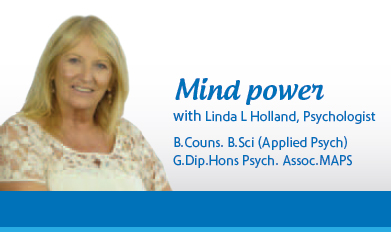 by Linda Holland – Psychologist
by Linda Holland – Psychologist
Your mind can affect your weight loss success.
I can attest that at times when I have felt down, unhappy, or even bored, I will eat something that I know is not on my healthy eating plan, however, it just feels good to eat it. This happens so often to so many people. There are many names for this, for example, “comfort eating” or “emotional eating”, to name just two. As a psychologist, I don’t see this as a problem as long as it is not habitual and is not practiced frequently as your only coping skill.
Where did the mind-food connection begin?
Adults who struggle with eating difficulties may have been given rewards in the form of food as children. A biscuit was meant to make us feel better; a lollipop was a treat or a reward and ice-cream was a comfort food. Also, we were given food treats to ensure “good behaviour.” I am sure many of us can recognise these habits that were ingrained in us as children. In psychology, these habits are called schemas.
Psychological connections between emotions and food are most commonly established from birth. How were most of us comforted as babies when we cried? Perhaps with milk and a cuddle. This continues growing up, for example, if you fell over and hurt yourself, you may have been given sweeties to make you feel better. Or perhaps as a teenager you had a breakup and you were given chocolates or alcohol to help you deal with the emotional pain. Did it make you feel better? Yes, it did! There is no denying it, and that’s because even though your logic is telling you that eating a bar of chocolate or drinking a big milkshake is not the best healthy option, you discard that information in lieu of your schema. The schema is “Treats offer comfort” and for some people, treats also offer love.
How is the mind-food connection affecting your weight loss?
There are many, many ways that our childhood schemas can work against our healthy choices today. One way of dealing with them is to work with a psychologist and challenge the inappropriate schemas. You can learn other choices, for example, if you’re sad because you have been emotionally hurt or let down, you might choose to write in a journal. Write a list of all the things you’re grateful for and write down positive ways you can treat yourself. This could be sitting down at the beach with a girly magazine, or taking a walk, breathing in and enjoying all the sounds and scents and visions around you (this is called mindfulness). You may decide to look up a recipe in one of Annette’s books and treat yourself in a healthy way. There are many, many other coping skills to choose from.
Breaking the mind-food connection
Just because you have a psychological connection to food, this does not mean you are weak. What it does mean is that you can change the way you eat, because it’s simply a behaviour and behaviours are learnt. Anything learnt can be unlearnt, so have faith in your ability to make change.
This content was provided by Linda Holland for book 7
For more help on this topic read Annette’s Emotional Eating Tips

